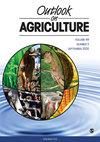性别、小麦性状偏好和创新吸收:来自埃塞俄比亚和印度的经验教训
IF 2.6
3区 经济学
Q1 AGRICULTURE, MULTIDISCIPLINARY
引用次数: 1
摘要
在绿色革命后的时代,许多改良小麦品种被发布和推广,以增强对生物和非生物胁迫的耐受性并提高生产力。然而,在以小麦为基础的全球南方农业系统中,性别不平等和其他社会不平等继续破坏公平获得改良品种的机会,特别是对妇女、贫困和边缘化农民而言。在这里,我们提出了将性别敏感技术的开发、传播和评价作为小麦品种改良计划的一部分的案例。我们评估了男性和女性小农在吸收现代小麦品种方面持续存在的各种挑战。我们的重点是埃塞俄比亚和印度,这两个地区有着实质性的小麦经济、普遍的贫困和性别不平等。关于小麦的社会经济文献相对较少,这些国家关于品种技术的评价研究有限且过时。品种技术评价最好能涵盖与小麦品种性状偏好、技术采用、与新品种和互补技术相关的决策和劳动力使用变化以及营养和经济效益相关的性别差异。本文呼吁有必要改变小麦研发项目的制度安排,以了解和寻求更好的小麦改良途径,积极促进性别平等和包容性。本文章由计算机程序翻译,如有差异,请以英文原文为准。
Gender, wheat trait preferences, and innovation uptake: Lessons from Ethiopia and India
During the post-Green Revolution era, numerous improved wheat varieties were released and disseminated to enhance tolerance to biotic and abiotic stresses and increase productivity. Still, in the wheat-based farming systems of the Global South, gender-based and other social inequalities continue to undermine equitable access to improved varieties, especially for women, poor, and marginalized farmers. Here, we present a case for gender-sensitive technology development, dissemination, and evaluation as part of wheat varietal improvement programs. We take stock of the various challenges that persist in the uptake of modern wheat varieties by male and female smallholders. We focus on Ethiopia and India, two geographies with substantive wheat economies, widespread poverty, and gender inequalities. The socio-economic literature on wheat is relatively thin with limited and dated gender-sensitive evaluation studies on varietal technologies in these countries. Varietal technology evaluations could ideally cover gender differences in relation to wheat varietal trait preferences, technology adoption, and associated decision-making and labor-use changes related to new varieties and complementary technologies, as well as nutritional and economic benefits. The paper calls for a need to change the institutional arrangements in wheat research-and-development (R&D) programs to understand and pursue better paths for wheat improvement to proactively contribute toward gender equity and inclusivity.
求助全文
通过发布文献求助,成功后即可免费获取论文全文。
去求助
来源期刊

Outlook on Agriculture
农林科学-农业综合
CiteScore
5.60
自引率
13.30%
发文量
38
审稿时长
>36 weeks
期刊介绍:
Outlook on Agriculture is a peer reviewed journal, published quarterly, which welcomes original research papers, research notes, invited reviews and commentary for an international and interdisciplinary readership. Special attention is paid to agricultural policy, international trade in the agricultural sector, strategic developments in food production, the links between agricultural systems and food security, the role of agriculture in social and economic development, agriculture in developing countries and environmental issues, including natural resources for agriculture and climate impacts.
 求助内容:
求助内容: 应助结果提醒方式:
应助结果提醒方式:


